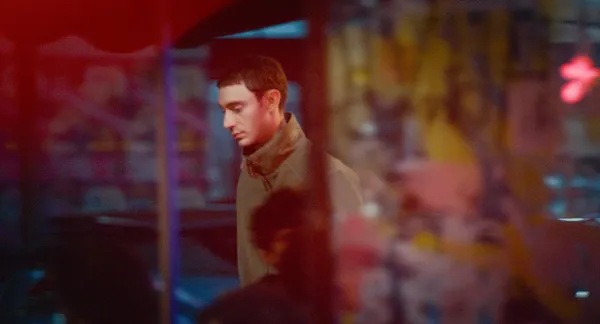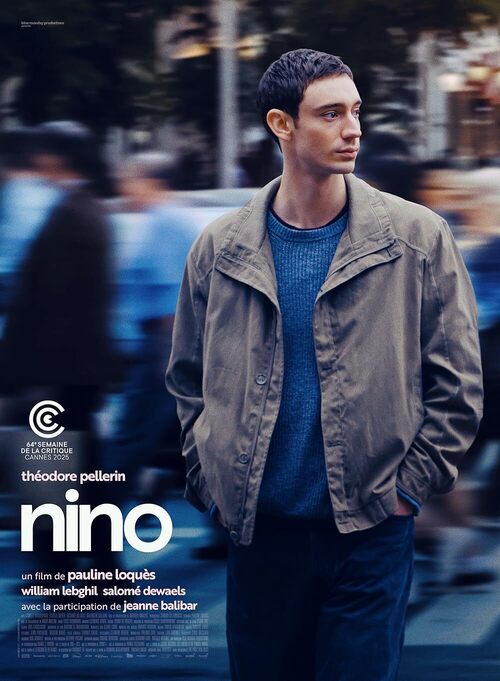Eye For Film >> Movies >> Nino (2025) Film Review
Nino
Reviewed by: Marko Stojiljkovic

Sometimes life does not turn out as we dreamed or dared to plan, but we still need to live it – it is the only one we have. Even advantages and privileges do not necessarily result in ease, luck or happiness: those born and raised in capital, metropolitan cities do not necessarily seize the opportunities theoretically presented to them, while being born to a “normal” family does not automatically result in learning how to communicate to the world and to forge relationships with others. The titular protagonist of Pauline Loquès’ Cannes Critics' Week-premiering debut feature Nino is technically an adult who has a job, a place to stay and friends to share his life with, but he still has a lot to learn in the wake of a potentially disastrous news.
All Nino (Théodore Pellerin in his second cast-topping role this year, after Sundance/Berlinale contender Lurker) wanted that Friday was a “get-out-of-job-free-card” due to his chronic fatigue and cold symptoms. Instead, he got a diagnosis: HPV, which has given him throat cancer.

The good news is that the cancer is localised and curable, and, since Nino is young, he is the top priority and he can start his treatment next Monday. The bad news is, however, that the treatment might cause sterility, so he should provide a bottle-full of sperm to be frozen in case he decides to have children at some point. He should also ask someone to act as his support as he goes to therapy sessions, which is not an easy task in Paris where people are burdened by their work commitments and where the estrangement has long set in.
To make matters worse, Nino has lost the keys to his apartment and the concierge of his building is not answering, meaning that he has to spend the weekend somewhere else. A visit to his mother (Jeanne Balibar) might secure him a hot meal and his teenage-years bed to sleep one night, but she is not a good listener he can open up to about what bothers him. Nino is not the most courageous person in the world, so he cannot simply pass the news on his condition and what caused it to his ex-girlfriend (Camille Rutherford). Not knowing what is going on, his buddies Sofian and Mounir throw him a surprise birthday party, while a chance encounter with a strange man in a public bathhouse (a cameo turn by Mathieu Amalric) reminds him that kindness of strangers often comes with a price tag of weird encounters.
However, the thing that might propel the much needed change in his life is a chance encounter with his old high school friend Zoé (Salomé Dewaels, glimpsed in Lost Illusions) whom he does not remember well. She is raising a son as a single mother and acts like a trustworthy person he could open up to. Their rekindled friendship might even spark a romance, and it also comes with certain perks too precious to spoil.
As a movie, Nino offers a glimpse into an ordinary, possibly unfulfilled life and the psyche of a contemporary man trying to reconfigure things in the wake of a challenge. Genre-wise, it could be defined as a drama dressed as an urban “pedestrian” road movie. Working from a script she wrote in collaboration with Maud Ameline, Pauline Loquès shows appropriate directorial choices and skill that might not be exactly flashy, but is not completely pedestrian either. The combination of hand-held camerawork by Lucie Baudinaud and the editing by Clémence Diard that serve the film’s dramaturgy – abrupt, even jump cuts as the protagonist finds himself in distress mixed with longer and more tranquil takes as he reaches serenity – serves the film well enough. Loquès also deftly uses music, indie rock played ambientally as well as the neoclassical synth theme as a part of the original score.
Most of her attention is, however, aimed at actors, especially Pellerin. He is facing one of the greatest acting tasks there are in the movies: to play an ordinary man as a complete and wholesome person, with virtues and vices, hopes and fears, dreams and limitations. Similar things are desired from other cast members, but with a difference that they usually have a scene or two, while Pellerin has to hold our attention for the whole duration. In what proves to be his most compelling role so far he achieves that through controlled acting under the director’s guidance which coupled with the elegant extended weekend framework lifts the overall quality of the film.
Reviewed on: 19 May 2025

















